The recent ceasefire between Israel and Iran, brokered by U.S. President Donald Trump, marks a fragile pause in a conflict that lasted 12 days and caused significant casualties and destruction.
However, doubts remain, particularly from Iran, about Israel’s commitment to upholding the ceasefire agreement, according to online media sources as of Sunday, June 29, 2025.
Background of the Conflict and Ceasefire
The conflict ignited on June 13, 2025, when Israel launched airstrikes targeting Iran’s nuclear facilities and military infrastructure.
It supposedly aimed to halt Tehran’s nuclear program, which Israel perceives as an existential threat.
Iran responded with a barrage of ballistic missile attacks against Israel, resulting in casualties on both sides—over 1,000 dead overall, including civilians.
After nearly two weeks of intense fighting, President Donald Trump announced on June 23 that Israel and Iran had agreed to a “complete and total” ceasefire, set to take effect imminently.
This announcement came shortly after Iran’s missile strike on the U.S. Al Udeid Air Base in Qatar, which hosted American forces.
Israel’s Position on the Ceasefire
Israeli Prime Minister Benjamin Netanyahu publicly accepted Trump’s ceasefire proposal.
He stated that Israel had achieved its objectives of neutralizing Tehran’s nuclear and ballistic missile threat.
Netanyahu’s office expressed gratitude toward the U.S. for its support in dismantling the Iranian nuclear menace.
It also emphasized that Israel would respond decisively to any violation of the ceasefire.
Despite agreeing to the truce, Israel conducted a retaliatory airstrike just hours after the ceasefire took effect, targeting a radar installation near Tehran in response to two ballistic missiles entering Israeli airspace, which were intercepted.
This incident highlighted the fragility of the truce and triggered a rebuke from Trump, who expressed frustration over the renewed hostilities.
Iran’s Skepticism and Doubts
Iran’s top military commander, General Abdolrahim Mousavi, has voiced serious doubts about Israel’s adherence to the ceasefire.
Speaking to Saudi Arabia’s defense minister, Mousavi warned that Iran remains prepared to respond strongly if Israel repeats any aggression.
He stressed that while Iran did not initiate the conflict, it responded with full force and remains vigilant against any breach of the truce.
Iran’s Supreme National Security Council also expressed mistrust toward Israel, affirming Tehran’s readiness to act decisively against any violations.
Iranian state media reported state funerals for senior military officials and nuclear scientists killed during the conflict, underscoring the heavy toll Iran suffered.

The Role of Mediation and Regional Dynamics
Qatar played a mediating role in facilitating the ceasefire, with its foreign minister urging all parties to respect the agreement brokered by the Trump administration.
This diplomatic effort was seen as a notable success for Qatari diplomacy amid a highly volatile regional environment.
Meanwhile, Israeli political analysts have questioned the clarity of Israel’s war aims.
They noted that Netanyahu’s claims of achieving all objectives prior to the ceasefire are “absurd” given the broad and shifting goals Israel announced during the conflict.
The pressure from the U.S. and the damage inflicted by Iranian strikes likely influenced Israel’s decision to accept the ceasefire.
Uncertainty and Fragility of the Ceasefire
Although the ceasefire has brought a temporary halt to active hostilities, the situation remains tense and uncertain.
Both sides have claimed victory, but the underlying issues, particularly Iran’s nuclear ambitions and Israel’s security concerns, remain unresolved.
The ceasefire has lifted wartime restrictions in Israel, allowing life to resume, but the threat of renewed conflict looms large.
The ceasefire’s durability is questioned by Iran’s military leadership, which has openly doubted Israel’s commitment and warned of a strong response to any future aggression.
Israel’s retaliatory strikes soon after the ceasefire’s inception further fuel these doubts.
Conclusion
The ceasefire between Israel and Iran, brokered by the Trump administration, provides a crucial but precarious pause in a dangerous conflict.
While Israel officially supports the truce, Iran’s leadership remains deeply skeptical of Israel’s intentions and commitment.
The fragile nature of this ceasefire underscores the ongoing volatility in the region and the complex challenges in achieving lasting peace.
Vigilance, diplomatic engagement, and mutual restraint will be essential to prevent a return to open hostilities.
In summary, Iran’s doubts over Israel’s commitment to the ceasefire are grounded in recent breaches and the unresolved strategic tensions between the two nations.
The international community’s role in monitoring and supporting the ceasefire will be critical in the coming weeks and months.







